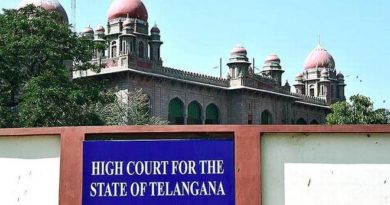Establishment Of Permanent Regional Benches of The Supreme Court of India; P. Wilson MP. Writes To Law Minister Kiren Rijiju
(Judicial Quest News Network)
Senior Advocate and Rajya Sabha Member P. Wilson of (DMK) from Tamil Nadu has written to Union Minister Kiren Rijuji to his attention on the issue of setting up regional benches of the A Supreme Court and also to increase the age of the retirement of High Court and make it 65 not 62 years.
While urging the need he expressed that there is an urgent need for the setting up of Permanent Regional Benches of the Hon’ble Supreme Court of India at Delhi, Chennai, Mumbai and Kolkata for the North, South, West and East Zones, apart from a Constitution Bench at Delhi. As you are well aware, access to justice is a fundamental right enshrined under our Constitution. The framers of our Constitution considered this right to be so sacrosanct that they enacted Article 32 – a direct access to the highest Court of the land to enforce fundamental rights. More so, the fundamental duty of the State is to ensure that opportunities for securing justice are not denied to any citizen by reason of economic or other disabilities.
P. Wilson Urged the Union Government in his letter for the past few years, we have been witnessing declining representation from all the sections of the society in the Apex Court. Many feels there is a ‘diversity deficit’ in our Supreme Court and the High Courts is not reflective of the wonderfully diverse and pluralistic society of India. Judicial diversity is fundamental to the quality of judging. Many social groups including women are poorly represented in the higher Judiciary.
Earlier the then Union Law Minister RS Prasad responded, in letters addressed to Wilson and Vaiko, that regional benches of the Supreme Court could not be set up due to the Constitutional obstacles and given that a related issue is pending before the Supreme Court.
On this Wilson had proposed to the authorities to amend Article 130.
“It is high time to amend Article 130 of the Constitution, since despite 70 years having passed since the coming into force of the Constitution, the fervent pleas of the people of the South, West and East and the members of the Bar in these States to establish Permanent Regional Benches of the Supreme Court is not heard and considered.”
P. Wilson while emphasising the need of the increment of the retirement age of the judges said that it is a persistent problem of backlog of cases in the higher judiciary — the High Courts and Supreme Court is a matter of grave public concern. As per recent statistics, there are 58,669 cases pending before the Supreme Court and about 45 lakh cases pending before the High Courts. It is a well-known adage that justice delayed is justice denied. There are several factors which contribute to the inability of our higher judiciary to effectively tackle the backlog of cases. One of the chief causes of delay in disposing cases is the large number of vacancies in High Courts across the country. This situation is further worsened by the fact that when judges retire, appointment of new judges in their places is not immediate. The Memorandum of Procedure for appointment of Judges states that the process of filling up of vacancies must commence six months prior to the expected date of retirement of High Court Judges, so that the vacancy is immediately filled upon retirement of a judge. However, due to various reasons, this process is not completed on time leading to large number of vacancies as stated above.
Judicial Diversity a Main Concern Many feels there is a ‘diversity deficit’ in our Supreme Court and the High Courts is not reflective of the wonderfully diverse and pluralistic society of India. Judicial diversity is fundamental to the quality of judging. Many social groups including women are poorly represented in the higher Judiciary. This may mean their rights are not being properly safeguarded, and may eventually lead to the infringement and violation of such rights. People of this country are afraid that a very narrow, homogeneous group of Judges belonging to certain class alone cannot necessarily reflect the views and values of society as a whole, particularly on issues involving diverse, linguistic, cultural and generational matters because they would require more perspectives, as Judges would interpret and enforce law based on their own backgrounds.
He also expressed his I was extremely glad to see that in the recent appointment of nine Judges to the Supreme Court, three women Judges were included. This trend should continue in future appointments as well. Similarly, other social groups should be duly represented in the benches of the Supreme Court. It is extremely important to support and protect diversity because by valuing individuals and groups in a manner free from prejudice, and by fostering a climate where equity and mutual respect are intrinsic, we create a fair society, which is needed for a country to run smoothly.
He also requested to the Union Government to take necessary steps ensuring equal representation of all States and support the Private Member’s bill introduced by him in the Rajya Sabha in the session




